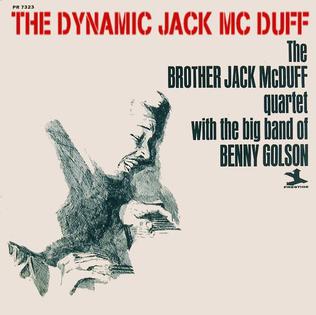LISTEN TO ONE: The Pink Panther
Jack McDuff's manager Lew Futterman, in the liner notes for the next session, describes how he got Golson and McDuff together:
McDuff had opened [at Birdland], and I was down there to see him...Benny and I ended up at the same table. While I was well aware of his writing, playing and arranging, we had never before met. I asked him how he liked McDuff. He said, "Great!" Since he was unaware what my relationship was to Jack, I pushed him a little farther by telling him I didn't like Jack's playing. His response was immediate. "You're entitled to your opinion. But I've never heard a jazz organist play with the feeling this man has. He shows such a great emotional quality, such a sympathy for the music that I could listen to him all night."
...He proceeded to say what I had felt since first hearing Jack play but had never been able to verbalize so succinctly--namely, that Jack McDuff exhibits a rare intuitive understanding of jazz, and of music in general. Nothing he plays seems stiff or structured, moving instinctively from one musical idea to the next, with no apparent disparity between what he feels he wants to play and what he can play. The excitement he generates is organic, rather than forced, as if he were thinking with his fingers.
At that point, Futterman outed himself to Golson, and asked if he'd consider writing some arrangements for McDuff.
"Only if I can write what I want to." I started to give him a qualified "yes," but decided better of it. A man with Golson's talent...deserves a free hand.
It seems quite certain that Golson had a free hand, because how else explain Henry Mancini's "Pink Panther Theme" on a jazz album? Or such was my first thought, on hearing it. But "Pink Panther" was a huge hit in 1964, the year of the movie's release, and a few different jazz artists covered it. There was a rhythm and bluesy version by Earl Bostic, another organ interpretation by Jimmy McGriff, and another big band arrangement by Quincy Jones.
As it turns out, they're all worth a listen. As a composer, Henry Mancini may have been a master of the obvious, but the operative word there is "master." The tune may have been perky and ubiquitous to have even become the punch line of a joke (What did the Pink Panther say when he stepped on an ant? --Dead ant...dead ant...dead ant dead ant dead ant....), but it was brilliant in its own silly way, and it responded nicely to the big band treatment, and to McDuff's bravura organ work.
The album's cover, however, promotes another movie tie-in--the theme from The Carpetbaggers, which is odd, in that although The Carpetbaggers was a blockbuster movie, its score, by the redoubtable Elmer Bernstein, was not a breakout success. Secondhandsongs, the website that keeps track of cover versions of nearly everything, cannot find a single one for the Carpetbaggers theme. YouTube turns up one other, by Jimmy Smith. Still, it's Elmer Bernstein, which means it's bound to be a decent tune (if a little too reminiscent of Bernstein's more popular theme from The Man With the Golden Arm), and Golson and McDuff certainly make it worth listening to.
Golson takes two from the movies, two from Broadway. The Broadway tunes are both from musicals of the 1960s. "Once in a Lifetime," by Leslie Bricusse and Anthony Newley, was one of the breakout hits from the musical Stop the World--I Want to Get Off, the star vehicle for Newley which had opened in 1962 and was still running. "You Better Love Me" was from the just-opened High Spirits, composed by Hugh Martin (best known for the songs from Meet Me in St. Louis) and Timothy Gray. One has to figure that all of these not-exactly-standards were chosen by Golson for how they'd sound with Jack McDuff counterpointed against an orchestra, and the proof is in the pudding. Golson was right.
McDuff brings his regular group. Golson brings an orchestra, personnel unidentified. The four tunes were all they recorded, and the B side of the album comes from McDuff's earlier date on the West Coast. Lew Futterman produced both sessions. The album is entitled The Dynamic Jack McDuff. "Pink Panther" and "Carpetbaggers" were released on 45. The version I've linked to on "Listen to One" is the 45 RPM version. Weighing in at 3:20, as opposed to the album's 5:15, which means more theme and less improvisation, but hey, it's the Pink Panther! Dead ant...dead ant...."Once in a Lifetime" was also released on 45, as the flip side of "Rail Head," from the earlier session.


2 comments:
Good one, Tad. Thanx for this.
Another McDuff- Benny Golson big band collaboration in 1965.
Post a Comment